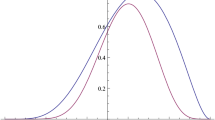Abstract
Given two random variables (X, Y) the condition of unbiasedness states that:E(X |Y=y)=y andE(Y |X=x)=x both almost surely (a.s.). If the prior onY is proper and has finite expectation or non-negative support, unbiasedness impliesX=Y a.s. This paper examines the implications of unbiasedness when the prior onY is improper. Since the improper case can be meaningfully analysed in a finitely additive framework, we revisit the whole issue of unbiasedness from this perspective. First we argue that a notion weaker than equality a.s., named coincidence, is more appropriate in a finitely additive setting. Next we discuss the meaning of unbiasedness from a Bayesian and fiducial perspective. We then show that unbiasedness and finite expectation ofY imply coincidence betweenX andY, while a weaker conclusion follows if the improper prior onY is only assumed to have positive support. We illustrate our approach throughout the paper by revisiting some examples discussed in the recent literature.
Similar content being viewed by others
References
Bhaskara Rao, K. P. S. and Bhaskara Rao, M. (1983).Theory of Charges, Academic Press, London.
Bickel, P. J. and Mallows, C. L. (1988). A note on unbiased Bayes estimates,Amer. Statist.,42, 132–134.
Brown, L. D. (1986).Fundamentals of Statistical Exponential Families, Institute of Mathematical Statistics, Hayward, California.
Cifarelli, D. M. and Regazzini, E. (1987). Priors for exponential families which maximize the association between past and future observations,Probability and Bayesian Statistics (ed. R. Viertl), 83–95, Plenum Press, New York.
de Finetti, B. (1937). A proposito di “correlazione”,Supplemento Statistico ai Nuovi Problemi di Politica, Storia ed Economia,3, 41–57.
Diaconis, P. and Ylvisaker, D. (1979). Conjugate priors for exponential families,Ann. Statist.,7, 269–281.
Lindley, D. V. (1958). Fiducial distributions and Bayes theorem,J. Roy. Statist. Soc. Ser. B,20, 102–107.
Loéve, M. (1978).Probability Theory II, 4th ed., Springer, New York.
Rao, M. M. (1984).Probability Theory with Applications, Academic Press, Orlando.
Regazzini, E. (1987). de Finetti's coherence and statistical inference,Ann. Statist.,15, 845–864.
Author information
Authors and Affiliations
Additional information
This work was partially supported by C.N.R. grant N.80.02970.10 (G.C.) and by C.N.R. grant “altri interventi” (P.V.). A preliminary draft was written while the Authors were visiting the Department of Statistics at Carnegie Mellon University.
The paper is the result of close cooperation between the two authors. However subsections 3.1 and 3.3 are mainly due to G.C. while subsection 3.2 and section 4 are mainly due to P.V.
About this article
Cite this article
Consonni, G., Veronese, P. Unbiased Bayes estimates and improper priors. Ann Inst Stat Math 45, 303–315 (1993). https://doi.org/10.1007/BF00775816
Received:
Revised:
Issue Date:
DOI: https://doi.org/10.1007/BF00775816




